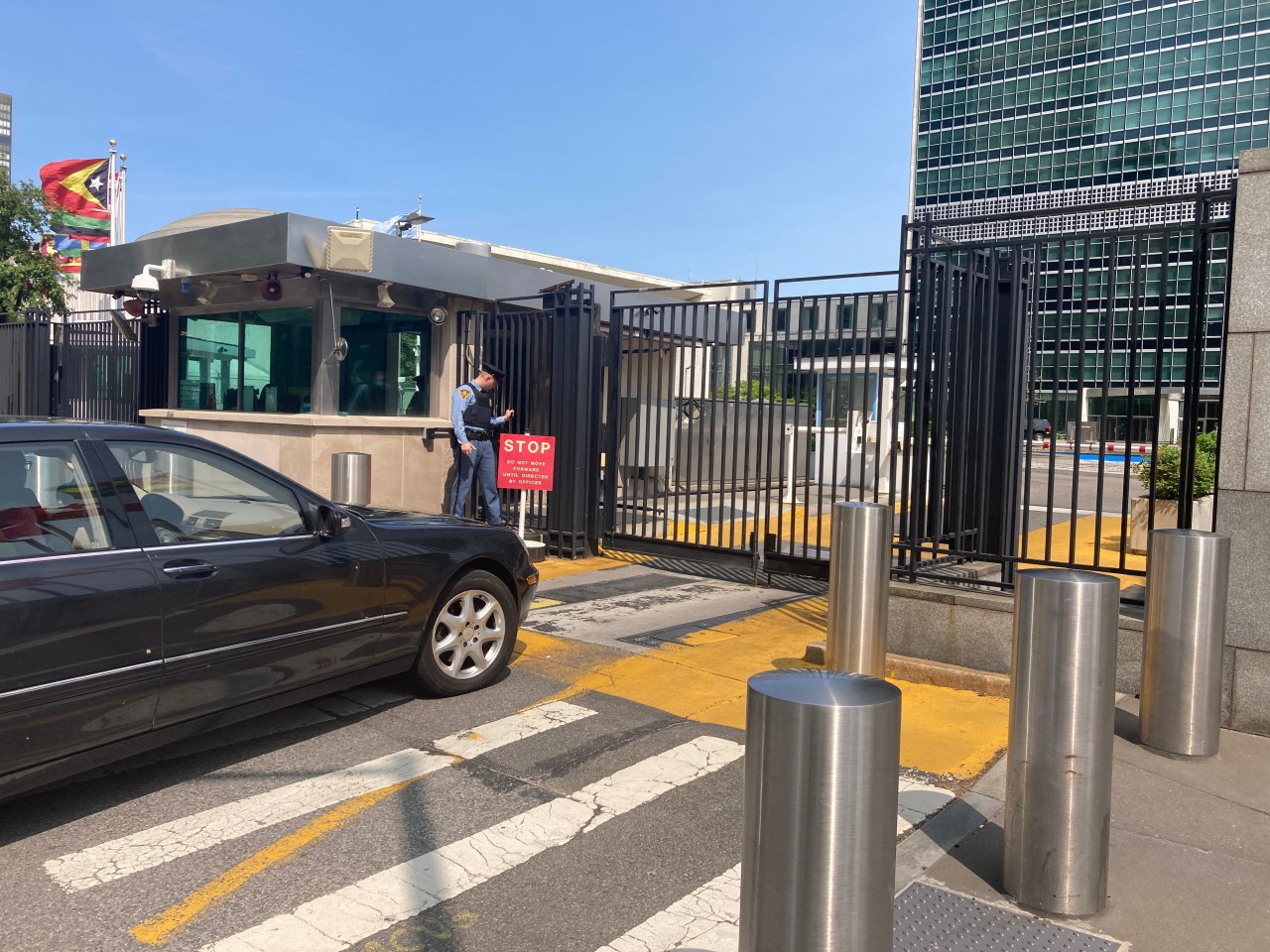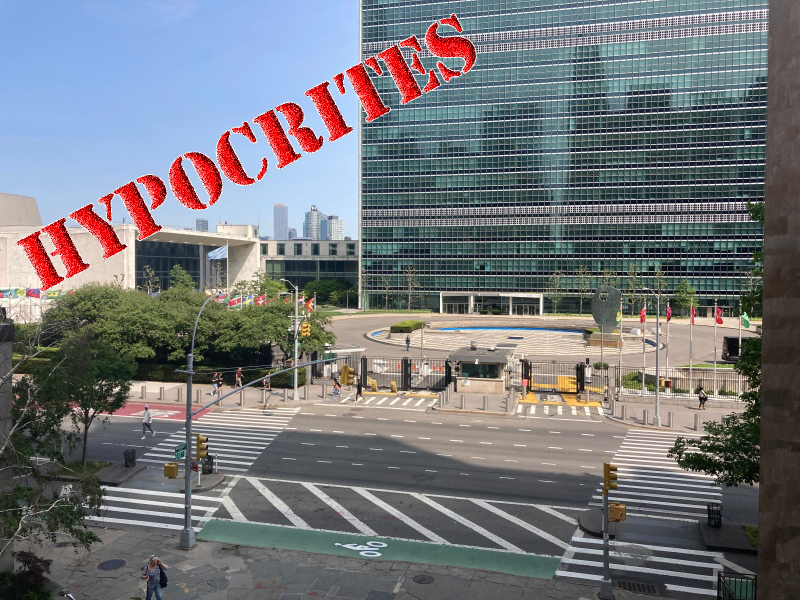Now, that’s not very diplomatic.
Cyclists are barred from bringing their two-wheelers onto the vaunted United Nations campus, while drivers, who are notorious for skirting parking tickets, are waved right through its security gates — a strange double standard for an organization that promotes environmentally friendly transportation to fight climate change, fed-up UN employees tell Streetsblog.
“There are slogans about greening, sustainability, and sustainable development and they banned single-use plastic from the compound and whatnot, but this really very conservative and unresponsive attitude towards this bike and bike parking situation, it is unclear to me why this is the case,” said Udo Fenchel, of Germany, and a member of the United Nations Advisory Committee on Administrative and Budgetary Questions.
Despite a GA-endorsed recommendation by the #ACABQ there‘s no action by @UN_OpSupport to achieve transport equity at UNHQ. Other duty stations provide safe and accessible bike parking, yet #UN in NY exile bike riders to a deserted area next to the FDR North ramp. #WorldBicycleDay pic.twitter.com/e5aAJ8s5e4
— Udo Fenchel (@foeniculum) June 3, 2022
UN employees who arrive via car or motorcycle to the Secretariat building on First Avenue and E. 43rd Street have access to a parking garage directly beneath the International-style building — they don’t even need to step outside; an elevator transports them directly from the below-ground garage to their offices. But those who commute by bike are not only turned around and forbidden from entering the compound, they’re forced to deposit their bikes at a facility on First Avenue and E. 48th Street — dangerously close to the on-ramp for FDR Drive north and roughly a five- to 10-minute walk from the main entrance.
“With a car and motorcycle you can easily access the UN garage, which is basically underneath the Secretariat building. You can either take the elevator or use the staircase, you’re not even exposed to weather or anything. It’s much more convenient,” said Fenchel.
[gallery type="slideshow" size="large" ids="501978,501980,501979"]
In mid-April, the UN did install several bike racks within its gates, but they are reserved only for high-ranking officials like ambassadors and deputy ambassadors, not for delegates, members of the General Assembly, other UN staff, or journalists, according to multiple employees.
“This is really VIP parking for very high-ranking member states,” said Fenchel.
It’s a start, but it’s not enough, added Cornel Feruta, the U.N. Ambassador from Romania, especially for an international intergovernmental organization that each year puts out damning reports on the worsening climate crisis, dubbing it a ticking “time-bomb.”
“We should do more and we’re not satisfied with this first step,” said Feruta, who also took his frustration to Twitter. “I’m sure there is much more we can do as individuals and professionals and we can provide a good example to others. It’s striking because you have, on the one hand, very lofty and ambitious objectives that we put on papers and high-level statements, but when it comes to delivering, it’s a major gap.”
A large group of ambassadors to the @UN is now making the case for bicycle access at the UNHQ. Hopefully, their clear message will help identifying the missing link so we don’t compete to park in the bus stop just outside.
— Cornel Feruta (@CornelFeruta) February 10, 2023
♫ I want to ride my bicycle, I want to ride my bike ♫ pic.twitter.com/3cOwYd8liB
The Advisory Committee on Administrative and Budgetary Questions, of which Fenchel belongs, recommended last year that the UN Secretary-General “identify a safe, secure, accessible and weatherproof location within the Headquarters for the parking of bicycles, e-bikes and electric scooters,” according to budget documents from earlier this year.
The General Assembly endorsed the recommendation in a resolution, but according to employees and documents, Secretary-General António Guterres failed to provide such a proposal, instead telling the committee that “any upgrade to existing infrastructures to accommodate bicycle parking would require extensive planning and resources to mitigate security risks.”
It also adds that providing bicycle access to the inside of the United Nations complex and parking garage would “compromise security operations.”
“I had the sense for quite a while that the administration was pretty unresponsive. The General Assembly, basically the parliament of the UN, made a decision that the UN administration needed to come up with a more convenient solution and there was not much movement,” said Fenchel.

Not only that, like many private residential buildings and universities across the city, the UN last November banned all electric — and for some reason folding — bikes from its entire campus, in the wake of the rising number of fires stemming from lithium-ion batteries. The email announcing the ban encouraged riders to use the parking facility at 48th Street, which is equipped with electric bike charging.
“We shouldn't hide the bicycles, it’s a statement. Foldable bikes, e-bikes are part of our reality. I think those who are using foldable bikes and electric bikes, other solutions should be identified as well,” said Feruta, who added that he helped facilitate bike parking right in front of the government office buildings in Romania.
But of course, Teslas and other electric vehicles are allowed on the grounds, employees say — a hypocrisy that staffers are starting to forcefully push back on, ahead of the UN's annual World Bicycle Day, which promotes the bicycle as an "instrument of sustainable transportation" and as having a "positive impact on climate." (Last year, ahead of World Bicycle Day, the United Nations gave an award to Clarence Eckerson Jr., the cycling advocate behind Streetsfilms.)
“People are realizing this does not make sense at all. People are complaining about the difference of treatment between bikes and cars,” said one UN employee who spoke on the condition of anonymity because he is not authorized to speak on the record. “Preaching about climate change and everything at the same time.”
At a daily news briefing on Wednesday, a spokesperson for the Secretary-General told reporters that Guterres has put forward a budget proposal to the General Assembly for 2024 to expand bike parking for all staff, including reporters, and move it closer to the main entrance. The spokesperson added that Guterres wants to move the needle on having the UN’s climate goals more closely align with its bike policies.
“We want to see greater bike access. We want to be more bike friendly. We want to be more friendly, full stop,” the spokesperson, Stephane Dujarric, told reporters. "And this is a step in the right direction. It's gone to the General Assembly because, obviously, as everything that anybody does in New York that implies real estate, implies cost. So we hope they will go through the General Assembly.”






